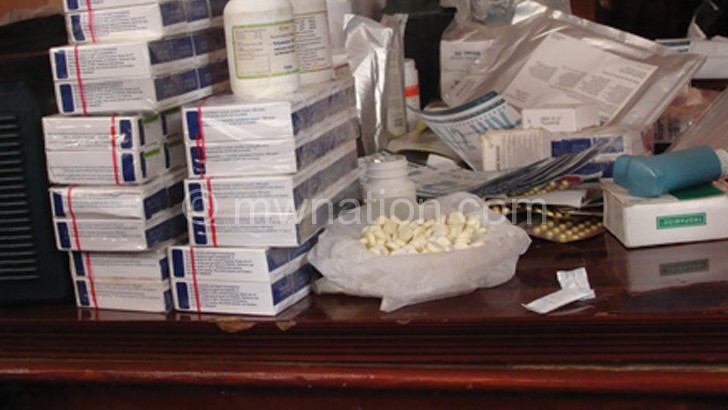Govt risks lawsuits over medical drugs
Malawi Law Society (MLS) has reminded government that the drug and medical supplies shortage in the country’s health facilities is not only unacceptable and inexcusable but also outright unconstitutional.
The lawyers’ body has warned that in line with its statutory mandate, it may take legal measures in the interest of the Malawian public. MLS also tipped off the public that they have a right to drag government to court over the medical drug crisis.

MLS, following reports of acute drug and medical supplies shortages in public health facilities where patients in some cases are only receiving prescriptions to buy from private pharmacies, told government the sooner it addresses the problem, the better.
MLS secretary Khumbo Soko said government’s failure to stock public hospitals with essential drugs is as a consequence passing an undeserved death sentence on the majority of the people.
Soko said this was not the first time his body was reminding the Executive about its obligation, adding the current scenario is an indicator that the institutions of governance in Malawi are fatally failing ordinary Malawians.
“It could be an indictment of the unsatisfactory manner in which the Executive and the Legislature have exercised stewardship of the interests of this country’s citizens. It is a failure of leadership,” Soko said.
He said it was no secret the overwhelming majority of Malawians are poor people and cannot afford the services of private health facilities.
Soko said: “The society takes cognisance of significant instances of pilferage that characterise the supply of drugs and medical supplies in the country. Its view, however, is that it is incumbent upon the State to have recourse to all such administrative, legislative and judicial measures to ensure that the chronic challenge of pilferage is dealt with once and for all.”
He said the State must at all times uphold the rights of Malawians to health, life and dignity and to meet its legal obligations, both municipal and international, by resolving this health sector crisis as a matter of grave priority.
Explaining about the law, MLS said the Constitution of Malawi under Section 13 (c) clearly enjoins the State to actively promote the welfare and development of the people of Malawi by progressively adopting and implementing policies and legislation aimed at achieving the provision of adequate health care, commensurate with the health needs of Malawian society and international standards of health care.
Soko said: “The Constitution also guarantees the rights to life and to human dignity under sections 16 and 19 (1). Under International human rights law, the right to health or to the highest attainable standard of health is well established.
“It had first been recognised as a social right as early as 1946 in the World Health Organisation (WHO) Constitution and was also provided for under the Universal Declaration of Human Rights in 1948 as well as under Article 12 of the International Covenant on Economic, Social and Cultural Rights of 1966.
He said Malawi is a State party to that and, therefore, the provisions of Article 12 are part of its law. Furthermore, most if not all of the provisions of the UDHR have now attained the status of international customary law and are thereby binding on States even without their express consent.
The law society, he said, noted that the full realisation of the right to health is dependent on availability of resources and that the paucity of the same may hamper it.
Recent Nation on Sunday findings revealed that a major referral hospital as big as Queen Elizabeth Central Hospital (QECH) did not have antibiotics and painkillers.
Nation on Sunday also established that the hospital did not have pethidine, a pain drug administered on patients that have been operated on or evacuated (post-miscarriage).
Central Medical Stores Trust (CMST), where both public health facilities and private hospitals buy their drugs from, disclosed in a response to a questionnaire on Thursday said it had around 60 percent of stock drug levels.
Asked to mention the type of drugs in short supply, the trust’s spokesperson Herbert Chandilanga said drugs are dynamic and their types vary with usage.
“However, CMST mitigates any drug requirements faster to the extent possible,” he said.
Health Minister Dr Peter Kumpalume in an interview last week attributed the drug and medical supplies shortages to inefficiencies in public hospitals and at CMST, but the trust said it was not aware of any communication from the Ministry of Health on this allegation.
“However, CMST works hand in hand with the Ministry of Health to ensure that medicines are available in all health facilities,” Chandilanga said.
Kumpalume is on record to have said he was on top of the situation.
Public health facilities had a bad reputation of not paying for drugs bought from CMST, and at one point the central medical stores, before it became a trust, was being owed money in excess of K3 billion.
While confirming some challenges the hospital was facing in procuring of drugs in an earlier interview, QECH chief administrator Themba Mhango attributed the problem to a system where the Ministry of Health is the one buying all medical drugs for all public hospitals.
Previously, before the 2012/13 fiscal year, public hospitals, using direct funding they were getting from government, had a leeway or liberty to buy the drugs from CMST or private suppliers.





